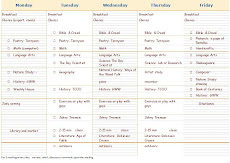I have been thinking about my little ones. For them, I don't want to have an academic type schedule. I want to focus on habits and baskets : ).
Here is a schedule for a young child from Mater Amabilis:
Monday - Religion, Reading, Painting, Break, Number, Handwork, Geography, Writing
Tuesday - Tales, Number, Handwork, Break, Reading, Singing Games, Writing, Nature Study
Wednesday - Poetry, Reading, Nature Study, Break, Number, Handwork, History, Writing
Thursday - Religion, Number, Handwork, Break, Reading, Singing Games, Writing, Tales
Friday - Tales, Reading, Picture Study, Break, Number, Handwork, Nature Study, Writing
It looks simple and uncluttered. In addition or rather, overlapping, are my "
Preschool Priorities".
I am going to try to make lists -- mental or physical "baskets" -- that can help me come up with things for these different areas. I'd like to overlap with the Year 7 topics a bit, just so that (1) the Year 7 child can help design activities for them (he is good at that and enjoys it) and (2) so that my head doesn't explode.
Now, for habits -- this year I want to read Charlotte Mason's ideas on habits, which are traced through all of her books, and come up with some things I want to emphasize and work on.
So the main "goals" for the little ones are goals for myself -- what *I* want to do and think about.
Here is the Level 1 Timetable from
Parent's Review
(For "Drill and Dancing" I can think Aidan's physical therapy and work Paddy in there too. For "handicrafts" and writing, brush-drawing etc I can work in his OT goals. and for the other subjects, I can work in his speech goals --- widening vocabulary and organizing skills for the content subjects, oral expression for narration, receptive language for listening to read-alouds).... then visual discrimination for things like nature study and object lessons)
When I have "baskets" or in other words, too many choices -- I get paralyzed, so I'm going to make some tentative sequential lists. But definitely, the curriculum is a lot more open at this age than it is for the older children.
If you take this Goal List (
A Formidable List of Attainments) it gives a start on categories:
Nature Study and Local Observation- to know the points of the compass with relation to their own home, where the sun rises and sets, and the way the wind blows
- to describe the boundries of their own home
- to describe any lake, river, pond, island etc. within easy reach
- to be able to describe 3 walks and 3 views
- to mount in a scrap book a dozen common wildflowers, with leaves (one every week); to name these, describe them in their own words, and say where they found them.
- to do the same with leaves and flowers of 6 forest trees
- to know 6 birds by song, colour and shape
- to tell three stories about their own "pets"--rabbit, dog or cat.
- to keep a caterpillar and tell the life-story of a butterfly from his own observations.
Song and Verse and Language -- Oral Expression- to recite, beautifully, 6 easy poems and hymns
- to recite, perfectly and beautifully, a parable and a psalm
- to name 20 common objects in French, and say a dozen little sentences
- to sing one hymn, one French song, and one English song
Number, Reading and Writing- to add and subtract numbers up to 10, with dominoes or counters
- to read--what and how much, will depend on what we are told of the child
- to copy in print-hand from a book
Literature and Narration- to tell quite accurately (however shortly) 3 stories from Bible history, 3 from early English (or American!), and 3 from early Roman history
Handwork- to send in certain Kindergarten or other handiwork, as directed
You can see I could break it up differently, to emphasize all the different subjects, but I am trying to keep it simple and targeted towards "habits" rather than a bunch of different "subjects".
 This is from Spring 2007 so it is out of date. Therapy Checklist for Aidan (PDF).
This is from Spring 2007 so it is out of date. Therapy Checklist for Aidan (PDF).






















